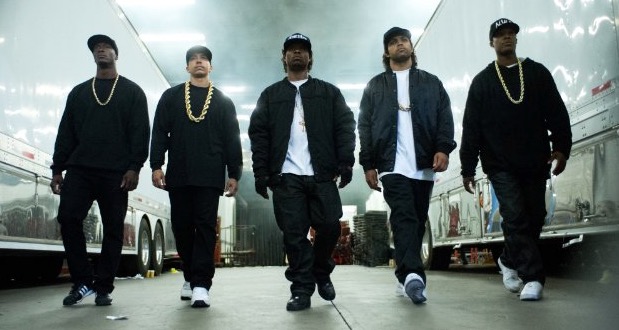
 This provocative and incredible story of the rise of N.W.A. is worthy and well-made and signals the beginning of awards season. It’s that good.
This provocative and incredible story of the rise of N.W.A. is worthy and well-made and signals the beginning of awards season. It’s that good.
At 2 hours and 45 minutes it’s rich and dense as it follows the dramatic journey of Compton rappers N.W.A. as an expression of a politically and socially important time and place.
N.W.A. was political and journalistic, painting vivid pictures of life in the lower middle class neighbourhood in L.A. highlighting the powerful sense of unease with which the residents lived. They were under attack from the LAPD and local violent criminals. Out of that métier came the music of anger.
It’s easy to see why the band focused its lyrics on police treatment of blacks in Compton and certain other parts of Los Angeles. Random and humiliating arrests dogged the existence of young black men living under unofficial police rule in the late 80’s.
According to the film – and the lyrics – if you’re black and have a pulse, you’re going to feel the heat of the LAPD even if you’re just standing on the street taking a break from recording.
It’s a shameful statement on knee-jerk police street theatre. It exposes the worst of the worst in a difficult time when the LAPD was widely regarded as corrupt and racist. N.W.A. simply reported the truth of their lives in lyrics. They were radicalised.

While on tour, the F.B.I. and police ordered N.W.A. not to perform their hit song F… the Police, but the band refused to buckle under pressure, citing freedom of speech. It didn’t go well for them.
That’s one part of it. The other is the personal and professional ties that bound N.W.A. and its key players Dr. Dre, Ice Cube, DJ Yella, M.C. Ren and the users and managers that came through their lives.
The internecine wars that resulted in spin offs, reunions and bad breakups are fascinating. The ebb and flow of partnerships reveals an uneasy creative brotherhood.
Suge Knight “the most feared man in hip hop” is shown as a psycho with a trigger finger and a posse of dogs and mercenary fixers. A terrific performance by R. Marcos Taylor brings home the man whose divisive politicking included murder.
A particularly poignant moment for N.W.A. comes in a news conference when they’re asked what they do with all their money when the truth is that there wasn’t any. Realisation dawns on them and they realise they’ve been swindled.
Paul Giamatti puts in a dazzling performance as the trusted but flawed manager who took particular notice of the late Eazy-E’s formidable talents. He didn’t survive scrutiny. Giamatti’s clever interpretation lulls us into trust and when he’s unmasked, it’s hard to believe.
Deeply observed performances enrich the film, particularly O’Shea Jackson Jr. who plays his father Ice Cube, Corey Hawkins as Dr. Dre, and Jason Mitchell in a stunning performance as Eazy-E. Tupac Shakur appears briefly, played by Marcc Rose who looks eerily like the late rapper.
There are no prominent roles for women; they are delegated to the sidelines as mothers, video hoes, lawyers, partygoers and arm candy. No quibbles, considering the moment in history.
The hard-driving music fires the story and moves it as a seductive, inflammatory, angry protest and an historical document of Los Angeles in a decade it perhaps would rather not acknowledge. Straight Outta Compton has epic proportion and heft and it demands attention.
At times stunning and never less than compelling it is clearly awards bait.